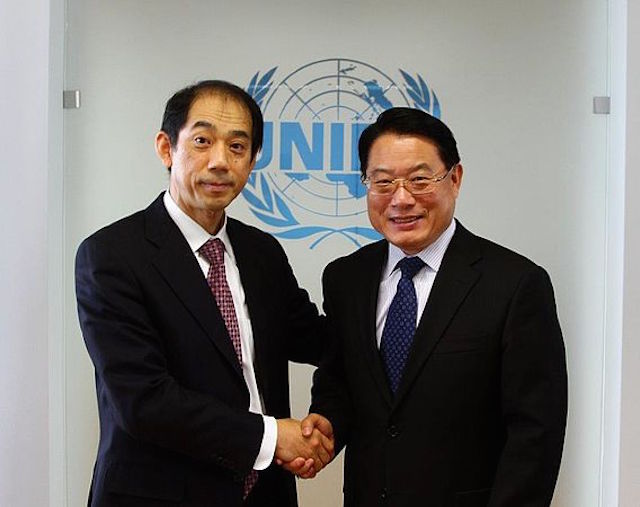VIENNA (IDN) – While several member states have been withdrawing their support to the United Nations Industrial Development Organization (UNIDO) over the years, Japan agreed on January 27 to replenish its financial contributions to the agency for encouraging the utilisation and dissemination of new low-carbon technologies particularly in Africa.
Japan’s Permanent Representative to the international organisations in Vienna, Ambassador Mitsuru Kitano, and the UNIDO Director-General Li Yong, signed an agreement on the second replenishment of about $2.5 million for the Low Carbon Low Emission Clean Energy Technology (LCET) Programme implemented by UN agency, among others, in Ethiopia and Kenya.
The agreement was signed within days of Belgium quitting UNIDO on January 20 and Denmark and Greece announcing that they would cease to be members of the UN agency end of 2016. Currently, UNDO has 169 states as members.
Over the previous five years, France, Britain, Portugal, Lithuania and New Zealand have left UNIDO. Canada, the U.S. and Australia are no longer members of the agency since the mid-1990s.
The reason behind the membership exodus has been “almost always the same”, reported the Austrian daily Die Presse on January 29: “Too much money for too poor performance”. The withdrawal of France in 2014 was a particularly heavy blow, says the newspaper, adding: “With about ten million dollars Paris represented almost ten percent of the UNIDO budget.”
During the signing ceremony, Ambassador Kitano emphasized that the LCET programme reflects the strong collaboration between the Government of Japan and UNIDO in the areas of energy, environment and technical cooperation in Africa, which is deemed a priority for Japan.
Kitano also said he received strong appreciation for the LCET programme when he visited Ethiopia and Kenya in March 2015. He added that the LCET programme showcases UNIDO’s strength in promoting productive activities and knowledge management.
According to UNIDO, as part of the LCET programme, the ongoing projects in Ethiopia and Kenya focus on demonstrating unique Japanese ultra-low head micro hydropower (ULH-MHP) technology systems, which are environment friendly. These systems will provide access to renewable energy for productive use in rural areas.
Compared to the conventional hydropower technologies, the micro hydropower system can be installed within a short period of time in standard water canals, including in irrigation systems, as well as in drinking and waste water canals, a UNIDO press release said.
The UN agency explained that the LCET programme fosters inclusive and sustainable industrial development through enhancing productivity, creating new jobs, boosting the use of clean and affordable energy, and providing training to the local communities.
It offers new opportunities for introducing innovative financing mechanisms such as the Government of Japan’s Joint Crediting Mechanism (JCM), which aims to facilitate the global diffusion of low-carbon technologies and products in developing countries.
The LCET programme was designed to help accelerate global clean energy innovation with the objective of making clean energy widely affordable. It also aims at contributing to the implementation of the Sustainable Development Goals (SDGs) agreed in September 2015 by the international community, and the year-end historic Paris climate agreement which recognizes technology transfer as an effective, long-term global response to climate change and as a contribution to promoting economic growth and sustainable development.
Meanwhile, despite walkouts by several important member states, UNIDO says that it “remains fully committed to use its vast experience and technical expertise to assist countries to use industrial development to achieve poverty reduction, inclusive globalization and environmental sustainability”. The agency celebrates its 50th anniversary this year. [IDN-InDepthNews – 8 February 2016]
Photo: Japan’s Permanent Representative to the UN in Vienna, Ambassador Mitsuru Kitano, and the UNIDO Director-General Li Yong.
2016 IDN-InDepthNews | Analysis That Matters
Send your comment | Subscribe to IDN newsletter
Follow us on Twitter and Facebook:
http://twitter.com/InDepthNews
http://www.facebook.com/IDN.GoingDeeper

